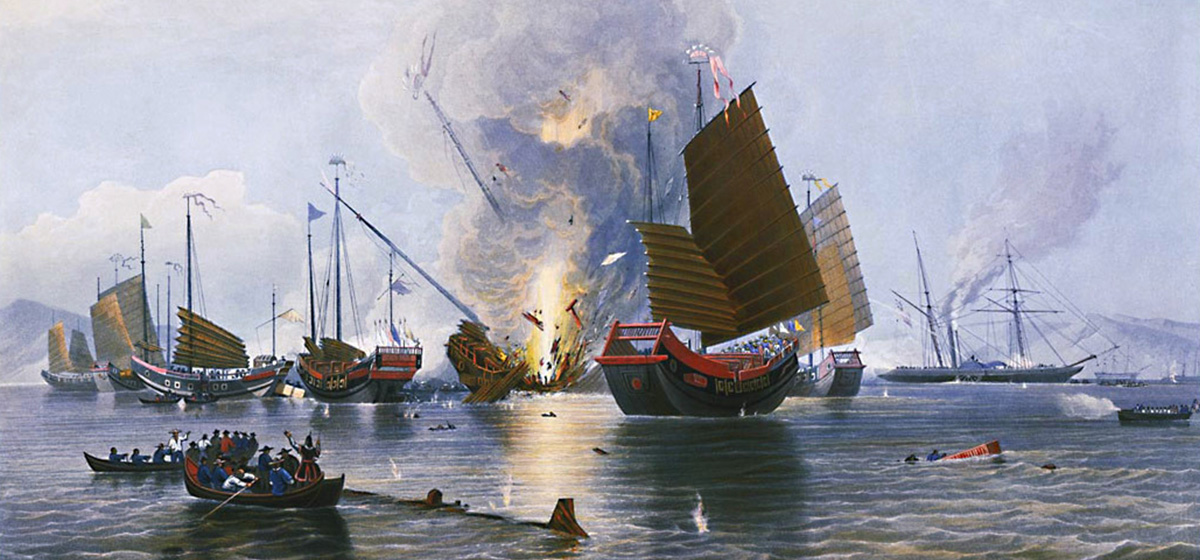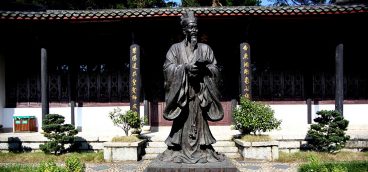China Proves the Point

“The founding of the People’s Republic of China marked the end of the humiliation and misery the country has suffered.” — Chinese President Xi Jinping
Most people who advocate pacifism do so out of revulsion against the horrors of war, certainly an understandable, if utopian, position.
But China’s Neo-Confucians adopted their anti-military stance mainly for a bizarre reason: they believed that Chinese culture was so superior to all other cultures that no nation would try to destroy China. Instead, belligerent nations would simply recognize the superiority of China and would aspire to transition their own culture peacefully to that of the Chinese. A strong military would therefore be superfluous and expensive.
As progress on military strategy, weaponry and other war-related technology slowed, the Chinese found—surprise, surprise—that they spent more than half their history governed by “barbarians,” mainly from Manchuria and Mongolia.
For example, non-Han Chinese invaders conquered Han Chinese dynasties and governed China from 386–581 (the Tuoba clan of the Xianbei), 907–1125 (the Kitan Liao), 982–1227 (the Tangut Xi Xia), 1115–1234 (the Jurchen Jin), 1206–1368 (the Mongol Yuan), and 1636–1912 (the Manchu Qing). The dates overlap because China was not always unified over the past 2,000 years.
Ironically, most of these “barbarians” did in fact adopt much of Chinese culture once they had conquered the Han dynasties, albeit “improving” it by layering on bits and pieces of their own cultures. Still, it was humiliating to be governed by “inferior” barbarian peoples, and the Han found themselves in more or less constant revolt against their overlords.
In other words, denigration of martial activities not only led to a humiliating subjugation by peoples the Chinese considered to be inferior to themselves—it also led to almost constant violence and warfare, exactly what the Neo-Confucians sought to avoid by their pacifism.
But if the Neo-Confucians thought it was humiliating to be dominated by local barbarians, matters were about to get a lot worse. By the early 1800s, while Chinese military strength had been ebbing for centuries, nations 5,000 miles to the west were becoming global military powers—and closer to home, so were Russia and Japan.
What the Chinese eventually came to call the “Century of Humiliation” at the hands of (mainly) Western powers began with the two Opium Wars (1839 and 1856), in which Chinese forces were utterly dominated by the smaller but vastly more powerful forces of Britain and France. The Western nations were able to project greater force thousands of miles from their homelands than the Chinese could muster in their own backyards. China’s defeats in these conflicts led to humiliating treaties, reparations, and lost territories, including Hong Kong.
In 1856, Russia forced China to cede Outer Manchuria to it, and in1885 China was forced to cede control over Vietnam and broader Indochina to the French. Defeats at the hands of the Japanese led to the loss of Taiwan. The crushing of the Boxer Rebellion by an eight-nation alliance in 1901 led to the imposition of reparations in excess of China’s annual tax revenue. Finally, the Japanese invaded and captured Manchuria in 1931 and, in 1937, invaded China proper, capturing Shanghai, Beijing, and Nanking (followed by the horrific Rape of Nanking).
China was a vast and populous country that could easily field an army of one million men, and at its zenith the Qing Dynasty ranked as the fourth largest empire in the history of the world (by area). Yet the Qing were defeated again and again by tiny (relatively speaking) Western armies.
Between 1839 and 1945, China won only one battle against Western forces (against the French in 1884). China never won—or even came close to winning—a naval engagement during this period, and many historians believe that China’s weakness on the seas was even more instrumental in its long humiliation than was its weakness on land.
The (Manchu) Qing Dynasty controlled China for 268 years, from its defeat of the (Han) Ming Dynasty in 1644 until its collapse at the hands of Western powers in 1912. But, as noted above, China’s humiliation was to continue right up until the founding of the People’s Republic in 1949.
In other words, China’s Neo-Confucian decision to devalue military preparedness led, just in the modern era, to domination by non-Han governments for more than three centuries.
The memory of that period remains so strong in the minds of China’s leaders that it has led to the opposite reaction: over-aggressiveness against outside powers, a determination to become the most powerful country in the world militarily, a disinclination to play by the rules of its former dominators, and a renewed belief that China is the center of the universe and the most important and admirable society in the world.
From Plato through the pre-Neo-Confucians in China through the Roman era and even tiny Switzerland (which hasn’t fought a war against a foreign power since 1815 but is armed to the teeth), all the way up to the present-day United States, it has been an article of faith that the best way to prevent war is to be prepared for it every single day.
It’s possible, of course, that this idea is wrong, or at least outdated. But the sorry experience of Neo-Confucian China, the consequences of which we are still grappling with today, strongly suggest that the best way to practice the art of peace is to learn, as thoroughly as possible, the Sun Tzu’s Art of War.





